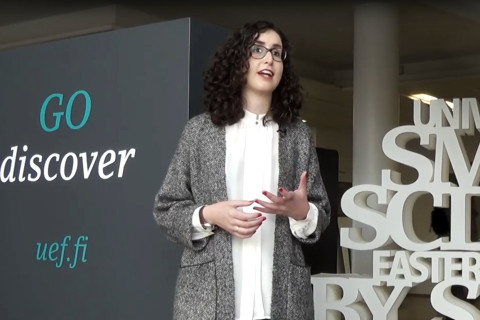“Doctoral studies have equipped me with the skills needed to adapt to change, adopt new methods, and work in different teams and cultures,” says Early Stage Researcher Olalla Díaz-Yáñez from the University of Eastern Finland School of Forest Sciences.
Doctoral graduates not only have solid expertise in their research topic, but they also possess other skills that are highly beneficial in working life. A joint initiative of five Finnish universities, the TOHTOS – Developing the Working Life Relevance of Doctoral Training – project, wanted to make these skills visible by inviting 100 doctoral students to showcase their expertise in videos lasting 100 seconds. The objective of the videos and the entire project is to facilitate the employment of doctoral graduates also in positions outside academia.
The collection of videos includes 22 doctoral students from the University of Eastern Finland, among them Díaz-Yáñez and University Teacher Anniina Kämäräinen. They both say that making a video was, for once, a good reason to think about and list one’s skills and strengths in detail.
“I’m interested in a research career, but I could also utilise my expertise in data science in the private sector,” Díaz-Yáñez says. Her doctoral dissertation focuses on the development of forestry sector risk management, among other things.
“Potential employers are not likely to become interested in me based on my degree alone; instead, I need to tell them what I have to offer.”
According to Kämäräinen, it is quite likely that her career after graduation will be somewhere outside academia. She is writing her doctoral dissertation in the field of special education.
“I use discourse analysis as my research method, and it is useful also in other contexts than research, for example in different development projects.”
In her video, Kämäräinen also lists the meta-skills she has learned as a researcher, such as project management, time management, funding acquisition, creative problem-solving, tolerance of insecurity, and interaction skills.
According to Coordinator Kristiina Väänänen, who is in charge of the TOHTOS project’s communications, this kind of reflection is exactly what the video project wanted to achieve.
“We also want to broaden employers’ perceptions of doctoral graduates and their skills.”
“Cuts in the budgets of universities and research institutes together with increasingly tough competition for research funding have reduced people’s opportunities to pursue a research career. Alternative career paths are something increasingly many doctoral graduates have to think about,” Senior Lecturer Merja Lyytikäinen says.
Working life skills and branding
The TOHTOS project has offered doctoral students courses and webinars on working life skills. One of the viewpoints is networking and how to create oneself a specialist brand online and in social media.
“The webinars offered on this topic have been very interesting. Making one’s own expertise visible is a continuous process of learning and trying out new things,” Díaz-Yáñez says.
She runs her own website and is active in different social media, including Twitter.
“This has led to interesting discussions also with people from outside my own field.”
“The best thing about this project is having someone at the university who encourages us to think about these things and also sees them as important,” Díaz-Yáñez sums up.
Ideas for the topics of training in the TOHTOS project were obtained from a survey conducted by the Aarresaari network on doctoral graduates’ ideas of important working life skills. The training sessions are open to all doctoral students of the universities participating in the TOHTOS project.
“We’ve had hundreds of participants from the University of Eastern Finland,” Lyytikäinen says.
As an outcome of the project, a training module on working life skills will be designed for Finnish universities, and courses from the module can be included in doctoral studies. Lyytikäinen and Väänänen assure that the development of working life connections will continue in the UEF Doctoral School also otherwise.
“We know that employers are interested in the expertise of doctoral graduates. The university could facilitate these links through, for example, mentoring, or by asking companies for real-life issues that researchers could solve in their summer schools. Networking with companies could also be a course assignment.”
The TOHTOS project is coordinated by the University of Tampere, and the partners are the University of Eastern Finland, the University of Turku, the University of Vaasa, and the University of Oulu. The project runs from 1 March 2016 to 30 June 2018, and it is funded by the European Social Fund, ESF.
All videos made by the doctoral students will be published on the website of the TOHTOS project. The videos by UEF doctoral students can also be found on the university’s YouTube channel.
For further information, please contact:
Kristiina Väänänen, Coordinator, TOHTOS project, kristiina.vaananen (a) uef.fi
Merja Lyytikäinen, Senior Lecturer, UEF Doctoral School, merja.lyytikainen (a) uef.fi
Watch the doctoral students’ videos: https://www.youtube.com/watch?v=o9LhT6FWtgM&index=6&list=PLaNfvlZd-a3WGCPtd22eSgBHMeujMX3VX
Twitter: @tohtos
Instagram @tohtos_fi



